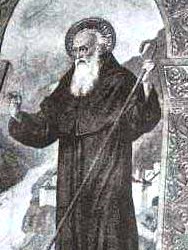Saint Attala
Saint Attala | |
|---|---|
 | |
| Abbot of Bobbio Abbey | |
| Born | 6th century Burgundy |
| Died | 627 Bobbio |
| Venerated in | Roman Catholic Church |
| Feast | 10 March |
Saint Attala (born 6th century in Burgundy; d. 627 at Bobbio) was a disciple of Saint Columbanus and his successor as abbot of Bobbio Abbey.
Biography
Attala first became a monk at the abbey of Lérins, but, displeased with the loose discipline prevailing there, he instead entered Luxeuil Abbey which had just been founded by Columbanus. When Columbanus was expelled from Luxeuil by King Theodoric II, Attala was to succeed him as abbot, but preferred to follow him into exile. They settled on the banks of the river Trebbia, a little northeast of Genoa, where they together founded the celebrated Bobbio Abbey.
After the death of Saint Columbanus in 615, Attala succeeded him as abbot of Bobbio. He and his monks suffered many hardships at the hands of the Arian King Arioald. As Abbot, Attala insisted on strict discipline and when a large number of his monks rebelled, declaring his discipline too rigorous, he permitted them to leave the monastery. When, however, some of these monks perished miserably, the others, considering their deaths a punishment from God, returned to the monastery.
Attala was buried in Bobbio where his liturgical feast is celebrated on 10 March.
Source
 This article incorporates text from a publication now in the public domain: Herbermann, Charles, ed. (1913). Catholic Encyclopedia. New York: Robert Appleton Company.
This article incorporates text from a publication now in the public domain: Herbermann, Charles, ed. (1913). Catholic Encyclopedia. New York: Robert Appleton Company. {{cite encyclopedia}}: Missing or empty|title=(help)
